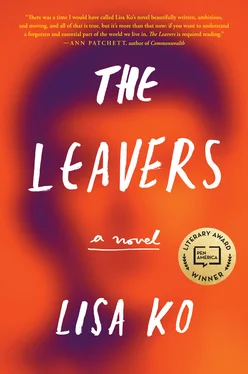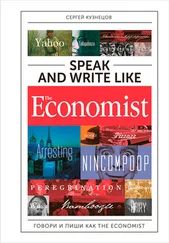One week passed. I slept all the time. I’d fall asleep at the table or standing at the sink, wake with a loud snore or when my feet wobbled. Sleep took over, sleep wiped me out, but in the moments before I succumbed, dark truths arrived. I’m fucked. I’ll have to give in and marry Haifeng.
I awoke to the sound of Haifeng’s mother and Yi Ba talking outside in the alley.
“She must be tired from all that work,” said Haifeng’s mother. “Haifeng says they work eight, nine hours at the factory.”
“Eight? That’s nothing,” Yi Ba said. “The city’s too harsh for a young girl. But I knew she’d come home sooner or later. So many people are going abroad now, it’s good she’s come home.”
“She’s grown up. She knows where she belongs.”
“The factory was only a phase. Testing her freedom.”
Haifeng’s mother laughed. “You can be glad that’s over.”
I sat up in bed. Yi Ba had taken the money I sent home and never complained. I heard him say, “Should I call you sister-in-law soon?”
“Not so fast,” said Haifeng’s mother. “I want a big dowry.”
“Hey, who says my dowry isn’t big?”
Two weeks passed. An Incredible American returned to Minjiang and had a party. He hadn’t been born an Incredible American but a mere villager like the rest of us, but had become an American by taking a train to Kunming, walking through the Burmese mountains, flying from Thailand to America, where he landed a job in a restaurant in Los Angeles, married an American — she was Chinese but had legit papers — and gotten naturalized, saved enough to pay off his debt and finally come home for a visit. His family was throwing a party at the mansion he built for them. I told Yi Ba I would rather scoop chicken shit than go, but he said it would look bad if every family showed up but us.
In school, I had known this Incredible American as Jing, a bully of a boy who’d been tight with the rest of the cadre sons and liked to sneak up behind girls and give them wedgies. At the party he did a poor job of pretending to not recognize me and Yi Ba. We stood in his mother’s living room near a fake marble statue of a young boy petting a fawn, the statue rotating on a battery-operated disc painted gold. I saw his eyebrows go up, followed by a calculated removal of this expression of recognition, his features settling into a parody of blankness. “Oh, that’s right, Peilan! From primary school. Now I remember you!”
“How are you, Jing?”
“ John . My name is John now.” He was only two years older than me but already had wrinkles around his mouth.
“How’s America?”
“Oh, it’s paradise. It’s another world.”
“How much debt do you have?” Yi Ba asked.
“Very little, now. Started as twenty-five thousand, though the going rate is more these days. But the travel is easier, quicker. If you’d like to know more, I can introduce you. She’s here today.”
Jing-John pointed at a woman with a faded caterpillar of hair on her upper lip, talking to some of the neighbors. Yi Ba had mentioned the lady with the mustache who arranged for people to travel abroad, and how she was responsible, indirectly, for the new mansions in the village. I said no thanks; didn’t want to give Jing-John the satisfaction. But Yi Ba accepted a slip of paper from him with the lady’s phone number.
Back at home, Yi Ba fell asleep. I noticed a hole in his socks, a pair he’d already mended several times. I walked around the room. Here were the bowls and chairs and pots from my childhood, which my mother had used before she died, the bowls now cracked, the pots burned on the bottom. I could stay here. Have the baby, take care of Yi Ba, have him take care of me.
Outside the window, I could see Haifeng’s house. There was a light inside, the shadow of Mrs. Li moving around in her own kitchen. I stepped away so she wouldn’t see me. Soon Haifeng would have to come home, too.
I saw myself in a new country, with my own apartment, like Qing’s cousin in Fuzhou. Xuan said in America, you could live anywhere you wanted to; it didn’t matter if you had rural or urban hukou. They wouldn’t care about things like pregnancy permits either.
Never mind the debt, so astronomical it was unreal, like the fake money burned graveside at Qingming holidays. Forget the grueling journey, which didn’t seem real either, the distances and destinations nothing but nonsense words to me. I’d go where Haifeng would never go.
When I told Yi Ba I was leaving, he let out a long sigh. “You too? Everyone’s leaving except me. By the time you come home, it’ll be for my funeral.”
“Don’t say that.”
I told him I would send him money, and when I got settled, he could join me.
He waved his hand dismissively. “I do well enough here.”
In the morning I made the phone call, and when the lady with the mustache asked if I was ready to leave at any time, I said yes.
It took me a few weeks to gather the money. At the riverbank I watched the lady count my down payment, the equivalent of three thousand American dollars, borrowed from relatives. They were sure that they’d receive an increase in status and income that came with having an American in the family. The rest, the forty-seven thousand, I borrowed from a loan shark. It would have taken me forty years, the rest of my working life, to earn fifty thousand American dollars in the village, but in New York, I hoped to pay it off in five or six.
A van drove me west on the highway to Guangxi. I took a train to Vietnam and another train to a packed apartment in Bangkok, where I received a fake Japanese passport that I would give back after getting to America. From Bangkok we flew on to Amsterdam, then Toronto, where I declared myself a refugee and followed two other women into a box in the back of a truck, which drove us to a house in New York. When they lifted the lid of the box, my pants were soaked with piss and my tongue raw from biting. I blinked at the lights and the shelves stocked with giant packages of toilet paper and bottled water, and the cars in the garage that were bigger than the biggest cars in Fuzhou, and the garage itself that was bigger than the main room in the house on 3 Alley, and I heard music playing and realized the words were in English. I tried to sit. “I’m here,” I shouted.
Now I owed forty-seven thousand to a loan shark in China, to be wired in twice-monthly installments if I wanted to avoid a higher interest rate. I knew what happened to those who didn’t pay enough, paid late, or didn’t pay at all. One threat, one knife-blade flash from the loan shark’s men, and it was pay now or disappear forever.
IN NEW YORK CITY, I changed. For one thing, I was no longer Peilan. One of the other girls in the Bangkok apartment had suggested Polly , an English name that sounded a little like Peilan. So it was Polly, not Peilan, who was doing thirteen-hour shifts in a garment factory, the same work Peilan had done in China except for eight times more money, and it was Polly who paid too much rent for a sleeping bag on the floor, the spot given to the roommate with the least seniority. I hadn’t thought I would live in a mansion like the one Jing-John built for his family, but I hadn’t expected to live in a shithole like the apartment on Rutgers Street, a cramped block with such an inferiority complex that things never smelled right, and the wind blew a steady stream of bags, cans, and plastic bottles down the sidewalk. The bedroom consisted of three bunk beds lined up so tight the women could only get out by crawling through the ends of their mattresses. I came home from work exhausted, ass throbbing from thirteen hours of sitting, and after a while I no longer noticed the jagged gaps in the walls or the floor tiles that had peeled away and exposed dirty crumbled plaster, or the cockroaches, or the drippy kitchen ceiling, and it didn’t bother me that I had to put my hand in the tank when I wanted to flush the toilet. Jing-John must have worked for years to buy that mansion and marble fawn.
Читать дальше











